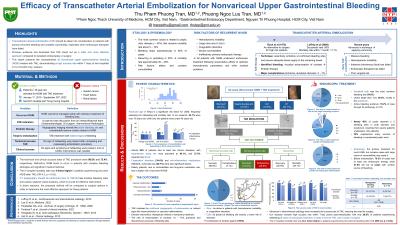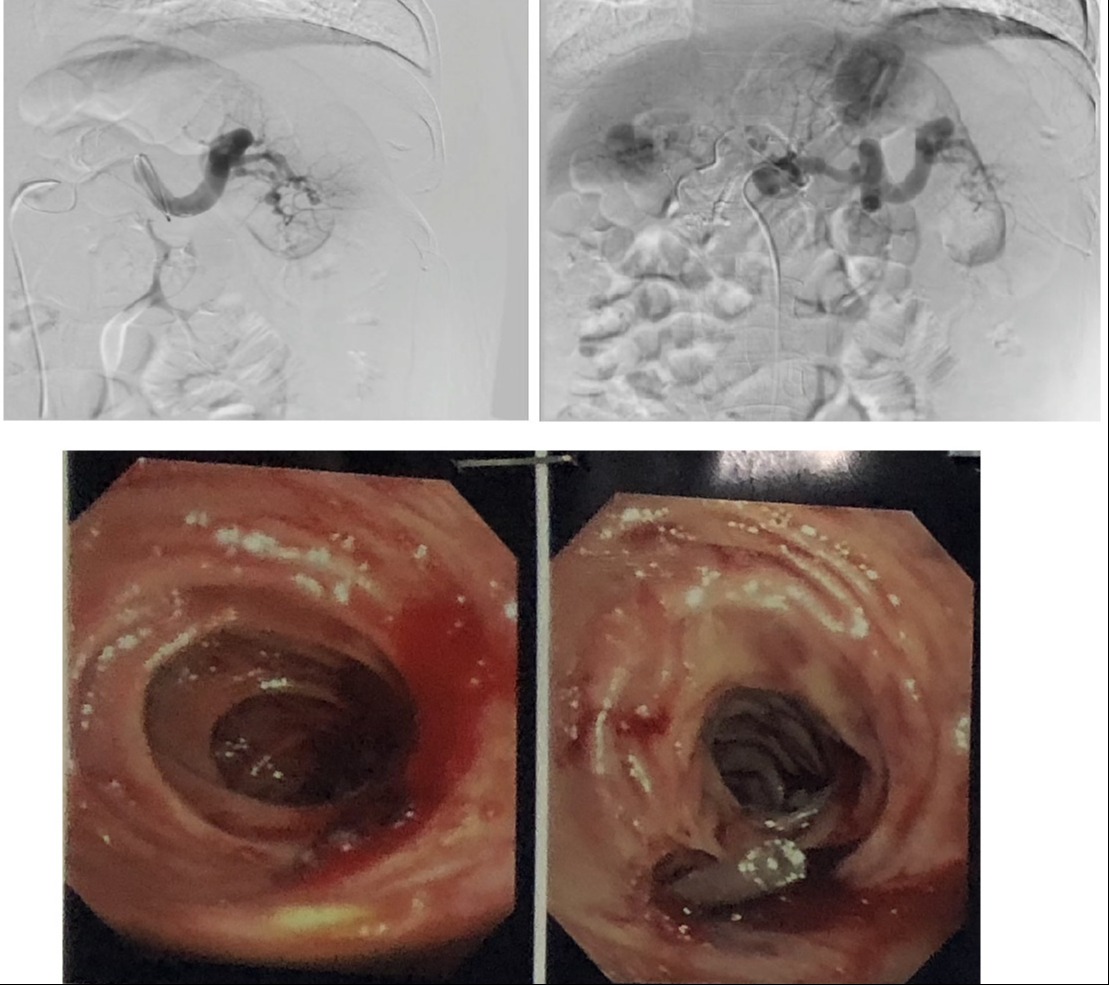Sunday Poster Session
Category: GI Bleeding
P0724 - Efficacy of Transcatheter Arterial Embolization for Nonvariceal Upper Gastrointestinal Bleeding
Sunday, October 27, 2024
3:30 PM - 7:00 PM ET
Location: Exhibit Hall E

Has Audio

Thu Pham Phuong Tran
Pham Ngoc Thach University of Medicine
Ho Chi Minh, Ho Chi Minh, Vietnam
Presenting Author(s)
Phuong Ngoc Luu. Tran, , Thu Pham Phuong. Tran,
Pham Ngoc Thach University of Medicine, Ho Chi Minh, Ho Chi Minh, Vietnam
Introduction: Upper gastrointestinal bleeding (UGIB) is common emergency illness. Approximately 5% of patients experiencing recurrent bleeding after endoscopic therapies face the high death threats, caused by the limitations of current endoscopic equipment and techniques and patients with unstable comorbidity. Recently, these cases should be taken into consideration when deciding on a case-by-case basis between transcatheter arterial embolization (TAE) and surgery. However, the previous evidence illustrated that TAE stood out as a safer and more effective approach. In this report, we aim to illustrate the characteristics of nonvariceal UGIB with TAE treatment and assess the rate of technical and clinical success within 7 days following the procedure in two Ho Chi Minh city’s hospitals, Vietnam.
Methods: Cases study of patients ≥ 18-year-old who had nonvariceal UGIB with TAE treatment from January 1st, 2019, to September 30th, 2022, in the Gia Dinh hospital and Trung Vuong hospital.
Results: We collected 64 nonvariceal UGIB cases treated by TAE. The most common bleeding site was in duodenal bulb (54.59% of cases), which has rich blood supply within the gastrointestinal region. There was a wide range of ulcer sizes, with 59.38% of cases exhibiting ulcers larger than 1 cm. Additionally, 78.12% of cases showed clearly bleeding evidence on gastrointestinal endoscopy or abdominal computer tomography. The technical and clinical success rate of TAE procedure were 96.87% and 73.44%, respectively. Serious complications accounted for 3.13%, including severe hypotension and liver ischemic. Finally, the in-hospital mortality rate was four times higher in patients experiencing recurrent gastrointestinal bleeding after TAE (OR 4.32, p = 0.02).
Discussion: The refractory nonvariceal UIGB occurs in patients with complex etiology of bleeding and serious medical history. Due to efficacy and safety, TAE should be considered to manage bleeding after unsuccessful endoscopic therapy. For future work, the proposed method will be compared with surgery to determine the right approach for these patients.

Disclosures:
Phuong Ngoc Luu. Tran, , Thu Pham Phuong. Tran, . P0724 - Efficacy of Transcatheter Arterial Embolization for Nonvariceal Upper Gastrointestinal Bleeding, ACG 2024 Annual Scientific Meeting Abstracts. Philadelphia, PA: American College of Gastroenterology.
Pham Ngoc Thach University of Medicine, Ho Chi Minh, Ho Chi Minh, Vietnam
Introduction: Upper gastrointestinal bleeding (UGIB) is common emergency illness. Approximately 5% of patients experiencing recurrent bleeding after endoscopic therapies face the high death threats, caused by the limitations of current endoscopic equipment and techniques and patients with unstable comorbidity. Recently, these cases should be taken into consideration when deciding on a case-by-case basis between transcatheter arterial embolization (TAE) and surgery. However, the previous evidence illustrated that TAE stood out as a safer and more effective approach. In this report, we aim to illustrate the characteristics of nonvariceal UGIB with TAE treatment and assess the rate of technical and clinical success within 7 days following the procedure in two Ho Chi Minh city’s hospitals, Vietnam.
Methods: Cases study of patients ≥ 18-year-old who had nonvariceal UGIB with TAE treatment from January 1st, 2019, to September 30th, 2022, in the Gia Dinh hospital and Trung Vuong hospital.
Results: We collected 64 nonvariceal UGIB cases treated by TAE. The most common bleeding site was in duodenal bulb (54.59% of cases), which has rich blood supply within the gastrointestinal region. There was a wide range of ulcer sizes, with 59.38% of cases exhibiting ulcers larger than 1 cm. Additionally, 78.12% of cases showed clearly bleeding evidence on gastrointestinal endoscopy or abdominal computer tomography. The technical and clinical success rate of TAE procedure were 96.87% and 73.44%, respectively. Serious complications accounted for 3.13%, including severe hypotension and liver ischemic. Finally, the in-hospital mortality rate was four times higher in patients experiencing recurrent gastrointestinal bleeding after TAE (OR 4.32, p = 0.02).
Discussion: The refractory nonvariceal UIGB occurs in patients with complex etiology of bleeding and serious medical history. Due to efficacy and safety, TAE should be considered to manage bleeding after unsuccessful endoscopic therapy. For future work, the proposed method will be compared with surgery to determine the right approach for these patients.

Figure: A 51-year-old male patient with duodenal ulcer is treated by empirical TAE treatment
Disclosures:
Phuong Tran indicated no relevant financial relationships.
Thu Tran indicated no relevant financial relationships.
Phuong Ngoc Luu. Tran, , Thu Pham Phuong. Tran, . P0724 - Efficacy of Transcatheter Arterial Embolization for Nonvariceal Upper Gastrointestinal Bleeding, ACG 2024 Annual Scientific Meeting Abstracts. Philadelphia, PA: American College of Gastroenterology.
